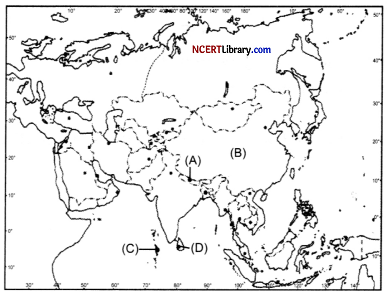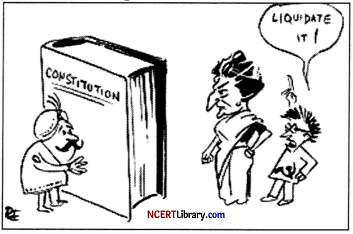Practicing the CBSE Sample Papers for Class 12 Political Science with Solutions Set 8 allows you to get rid of exam fear and be confident to appear for the exam.
CBSE Sample Papers for Class 12 Political Science Set 8 for Practice
Time: 3 Hours.
Max. Marks: 80
General Instructions:
- All questions are compulsory.
- Question numbers 1-12 are multiple choice questions of one mark each.
- Question numbers 13-18 are of 2 marks each. Answers to these questions should not exceed 50 words each.
- Question numbers 19-23 are of 4 marks each. Answers to these questions should not exceed 100 words each.
- Question numbers 24-26 are passage, cartoon and map-based questions. Answer accordingly.
- Question numbers 27-30 are of 6 marks each. Answers to these questions should not exceed 170 words.
Section – A (12 Marks)
Question 1.
The Congress party was a ________ party. [1]
(a) Rainbow
(b) Autocratic
(c) Minority
(d) Upper caste
Question 2.
Which step was NOT taken in the 60th-anniversary meeting of the UN? [1]
(a) Establish the Human Rights Council
(b) Agreement to achieve MDG
(c) Create Peacebuilding Commission
(d) Dissolve the International Court of Justice.
Question 3.
The global economy relied on ________ for much of the 20th century as a portable and indispensable fuel. [1]
(a) Oil
(b) Natural resources
(c) Water
(d) Sun
![]()
Question 4.
Pick the ODD one out. [1]
(a) Establishment of the United Nations – Political globalization
(b) Wearing blue jeans with kurta- Cultural globalization
(c) Volkswagen selling cars in India- Economic globalization
(d) Border problems between India and Pakistan – Political globalization
Directions for Q.Nos. 5 and 6
In the questions given below, there are two statements marked as Assertion (A) and Reason (R). Read these statements and choose one correct answer from the given options.
(a) Both A and R are true and R is the correct explanation of A.
(b) Both A and R are true and R is not the correct explanation of A.
(c) A is true but R is false.
(d) A is false, but R is true.
Question 5.
Assertion (A): Expansion of the concept of security does not mean that we can include any kind of disease or distress in the ambit of security.
Reason (R): The concept of security stands to lose its coherence. Everything could become a security issue. [1]
Question 6.
Assertion(A): A large number of economies of the South are now being re-opened to MNCs through the liberalisation of the global economy.
Reason(R): The minerals industry is one of the most powerful forms of industry on the planet. [1]
Question 7.
SAARC refers to: [1]
(a) South Asian Association for Regional Cooperation
(b) Asian Association for Regional Cooperation
(c) Southern Asia Association for Regional Cooperation
(d) South Asian Association of Regional Cooperation
Question 8.
Which of the following statements about South Korea are true? [1]
(i) Many of South Korean popular brands are sold in India.
(ii) South Korea is a permanent member of the UN Security Council.
(iii) South Korea’s military expenditure is tenth largest.
(iv) South Korea became a member of the OCED in 1996.
Codes:
(a) (i), (ii) and (iii)
(b) (iii) and (iv)
(c) (i), (iii) and (iv)
(d) (i) and (iii)
Question 9.
Name the state that launched the program of ‘New Democratic Initiative’. [1]
(a) Tamil Nadu
(b) Kerala
(c) Andhra Pradesh
(d) Telangana
Question 10.
Arrange the following in chronological order: [1]
(i) Rio de Janeiro Earth Summit
(ii) Antarctic Treaty
(iii) Kyoto Protocol
(iv) Montreal Protocol
Codes:
(a) (i), (ii), (iii), (iv)
(b) (iii), (ii), (i), (iv)
(c) (ii), (iv),(i), (iii)
(d) (ii), (i),(iii), (iv)
Question 11.
After independence at the party system level, India witnessed ________. [1]
(a) Coalition in party
(b) Hung parliament
(c) Multi-party system
(d) Coalition of parties
Question 12.
Name the personality who is known as the ‘Father of Green Revolution in India’. [1]
(a) Dr. M.S. Swaminathan
(b) Dr. Norman Borlaugh
(c) Dr. William Gande
(d) Dr. Verghese Kurien
Section – B (12 Marks)
Question 13.
What was the theme of Integral Humanism? [2]
Question 14.
Evaluate the work of UNEP. [2]
Question 15.
What the resistance that Nehru faced in India for his Non-Alignment policy? [2]
Question 16.
Highlight features of the Bombay Plan. [2]
Question 17.
Highlight any two components of India’s security strategy. [2]
Question 18.
Suggest any one effective step which would limit war or violence between countries. [2]
![]()
Section – C (20 Marks)
Question 19.
What is the full form of WTO? When was it set up? How does it function? [4]
Question 20.
Give any two examples to show that globalization has affected our food habits. [4]
Question 21.
Analyse the political and social aspects of the Soviet system prior to 1991. [4]
Question 22.
How did the rise in global demand for steel lead to the raised the importance of Orissa? [4]
Question 23.
“In spite of the decline of Congress dominance the Congress party continues to influence politics in the country.” Do you agree with the given statement? Give arguments in support of your answer. [4]
Section – D (12 Marks)
Question 24.
Read the passage given below and answer the questions that follow: [4]
A coup took place in 1991 that was encouraged by Communist Party hardliners. The people had tasted freedom by then and did not want the old-style rule of the Communist Party. Boris Yeltsin emerged as a national hero in opposing this coup. In December 1991, under the leadership of Yeltsin, Russia, Ukraine and Belarus, three major republics of the USSR, declared that the Soviet Union was disbanded. The Communist Party of the Soviet Union was banned. Capitalism and democracy were adopted as the bases for the post-Soviet republics.
(i) What immediately preceded the 1991 coup in the USSR?
(a) Reforms by Gorbachev and Communist party opposition to the reforms
(b) USSR’s invasion of Afghanistan
(c) Unification of Germany
(d) The Shock Therapy
(ii) ________ emerged as a national hero in opposing the coup in 1991.
(a) Mikhail Gorbachev
(b) Vladimir Putin
(c) Boris Yeltsin
(d) Nikita Khrushchev
(iii) Which of the following statements is NOT true about the 1991 coup?
(a) The Communist party was able to come out victorious from the coup.
(b) The Communist party was banned.
(c) After the coup capitalism and democracy was adopted.
(d) The coup was encouraged by Communist party hardliners.
(iv) In December 1991, ________ declared that Soviet Union was disbanded.
(a) Russia and Ukraine
(b) Russia, Ukraine and Belarus
(c) Ukraine and Belarus
(d) Russia
![]()
Question 25.
In the given political outline map of South Asia, four countries have been marked as A, B, C and D. Identify them on the basis of the information given below and write their correct names in your answer book along with their respective serial number of the information used and the concerned alphabet as per the following format: [4]
(i) An important country but it is not considered to be a part of South Asia.
(ii) This country has a successful Democratic System.
(iii) This country had Constitutional Monarchy.
(iv) An island nation which was a Sultanate till 1968
| Sr. no. of the Information used | Concerned alphabet | Name of the State |
| (i) | ||
| (ii) | ||
| (iii) | ||
| (iv) |

Question 26.
Study the given Cartoon and answer the questions that follow: [4]

(i) Which Article of the Constitution was invoked during the National Emergency?
(a) Article 352
(b) Article 99
(c) Article 356
(d) Article 249
(ii) What are the special powers given by the Constitution once the National Emergency is declared?
(a) Curtailment of fundamental rights of people
(b) Curtailment of federal rights of the state
(c) (a) and (b) both
(d) None of the above
(iii) Who among the following was the President of India when the National Emergency was declared?
(a) Fakhruddin Ali Ahmed
(b) Pranab Mukerjee
(c) B.D.Jatti
(d) V.V.Giri
(iv) Which of the following commissions was appointed to look into the abuse of power during the Emergency?
(a) Nanavati Commission
(b) Liberhan Commission
(c) Mandal Commission
(d) Shah Commission
Section – E (24 Marks)
Question 27.
Keeping in view the internal dimension of the problem of Jammu and Kashmir, highlight the external and internal reasons that made J & K a controversial and conflict-ridden state.
OR
Discuss the development of Assam Movement from 1979 onwards. State the main provision of the agreement made with Prime Minister Rajiv Gandhi in 1985. [6]
Question 28.
Analyze the history of the conflict between the Sinhalese and Tamil people. How did it result in the Civil War in Sri Lanka?
OR
Enlist some factors that have led to the multiple failure of democracy in Pakistan. [6]
Question 29.
How does political leadership of a nation affect its foreign policy? Explain this with the help of examples from India’s foreign policy.
OR
Analyze the events that took place during the India-China war of 1962. [6]
Question 30.
Analyze any three demerits of globalization.
OR
Give an analysis on two positive and any two negative effects of globalization. [6]
![]()